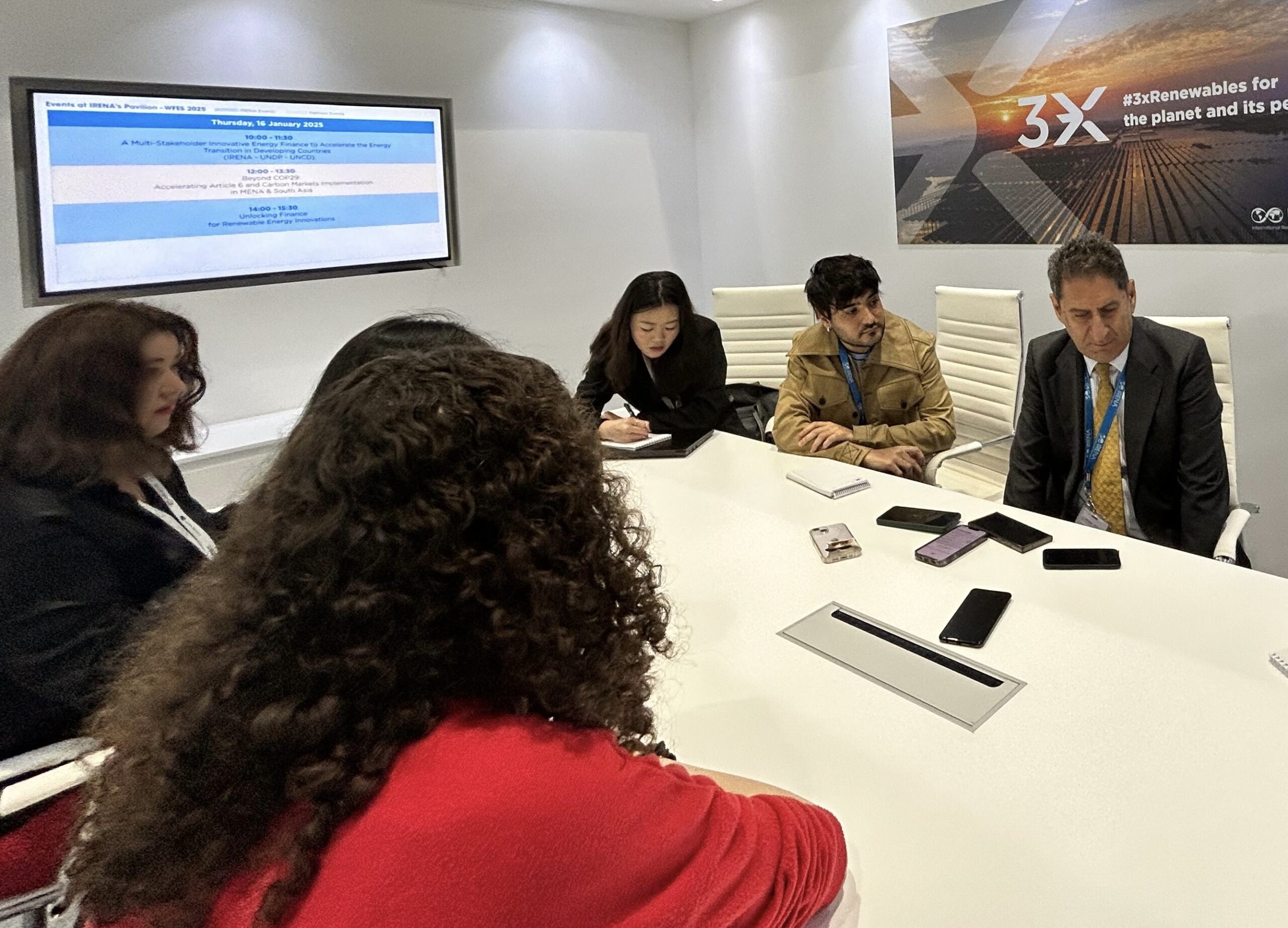Central Asia’s Renewable Energy Potential Highlighted at ADSW 2025
Table of Contents
ABU DHABI — During Abu Dhabi Sustainability Week (ADSW) 2025, Francesco La Camera, director general of the international Renewable Energy Agency (IRENA), underscored the critical importance of interconnectivity in advancing renewable energy initiatives in Central Asia.

La Camera with a group of journalists on the sidelines of ADSW 2025 on Jan. 16. Photo credit: IRENA
La Camera highlighted the region’s immense potential to reduce electricity costs, produce green hydrogen, and eventually export energy to Europe.
Central Asia’s Renewable Energy Potential
“Interconnectivity is key. We are organizing an investment forum for central Asia during Energy Week in Baku this June. Strengthening connections within the region and linking to the European market are essential steps forward,” said La Camera.

La Camera’s remarks come at a time when Central Asia is increasingly being recognized for its renewable energy potential. The region’s vast natural resources, including solar and wind, offer notable opportunities for sustainable energy production.
The upcoming investment forum in Baku aims to attract international investors and foster collaboration among Central Asian countries. By enhancing regional interconnectivity and establishing links to the European market, Central Asia can play a pivotal role in the global transition to renewable energy.
Central Asia’s Renewable Energy Potential: A New Frontier for Solar and Hydrogen
Central Asia is emerging as a promising hub for renewable energy, notably in solar and hydrogen production, according to Francesco La Camera, Director General of the International Renewable Energy Agency (IRENA). The region’s vast, untapped land resources make it an ideal location for large-scale solar installations, unlike more space-constrained countries such as italy.
“Central Asia has the potential to produce green hydrogen and embrace a new energy system,” La Camera stated. He emphasized that the global energy landscape is shifting towards renewables, with green hydrogen and sustainable biomass playing complementary roles. “We are transitioning to a system dominated by renewables.It’s vital for countries and markets to recognize this shift, adapt, and maximize the benefits of this transformation,” he added.
La Camera highlighted that Central Asia is beginning to understand how renewables can lead to lower energy prices and enhanced energy security. The region’s abundant land resources offer a unique opportunity to install extensive solar plants, positioning it as a future leader in renewable energy production.
China’s Leadership in Renewable Energy
During the interview, La Camera also acknowledged China’s significant strides in renewable energy and storage technologies.He pointed to China’s substantial investments in new energy systems and its progress in addressing environmental challenges.
“Fifteen years ago, Beijing was covered in smog—you couldn’t even see the sun.China recognized the urgency to change and shifted decisively toward renewable energy. Today, it leads the world in technologies like battery storage, electric vehicles, and circular economy practices,” La Camera noted.
China’s advances in energy storage, such as developing ultra-fast charging technology for electric vehicles, were also highlighted. “Chinese innovation is now setting benchmarks globally.They’ve gone from being perceived as followers to becoming leaders in green technology,” he said.
Infrastructure and Interconnectivity
La Camera emphasized the critical role of interconnectivity in advancing renewable energy development in Central Asia. He noted that countries like Azerbaijan are making strides to enhance energy infrastructure. “Azerbaijan has committed to doubling its pipeline capacity to Europe. Agreements like the one recently signed between Albania and Italy—facilitated by the UAE’s TAQA utility company—demonstrate how infrastructure is evolving to enable cross-border energy flows,” he explained.
Linking Central Asia’s renewable energy systems to Europe could leverage existing infrastructure projects, driving investment and reducing electricity costs for the region. “Infrastructure is a major focus because it drives investment and reduces electricity costs for the region. Central Asia has tremendous potential—it’s a region where renewable energy can flourish and even be exported to Europe,” La Camera added.
As the global energy system continues to shift towards renewables, Central Asia’s vast land resources and strategic location position it as a key player in the future of green energy. With the right investments and infrastructure, the region could become a major exporter of renewable energy, contributing to global efforts to combat climate change and promote sustainable development.
Global Cooperation Key to Advancing Renewable Energy, Says La Camera at Abu Dhabi Summit
In a compelling address at the Abu Dhabi Sustainability Week (ADSW) 2025, Francesco La Camera, Director-General of the International Renewable Energy Agency (IRENA), highlighted the critical need for strategic investments in renewable energy infrastructure, storage, and grid modernization. La Camera emphasized that while fossil fuels continue to meet current energy demands,the transition to renewable energy is imperative for a sustainable future.
International Cooperation: A Pillar for Sustainable Energy
La Camera underscored the importance of global cooperation in the shift towards sustainable energy systems. He called for heightened public awareness and collaborative efforts among nations to build an inclusive and resilient renewable energy ecosystem.
“We must sensitize people to this new reality.The energy transition is happening, and it’s up to governments, businesses, and society to align with it and ensure they benefit from this transformation,” La Camera stated.
President Tokayev’s Commitment to Sustainability
President Kassym-Jomart Tokayev of kazakhstan also attended the summit on January 14, where he delivered a speech addressing the pressing challenges of global climate change, desertification, extreme weather events, and food insecurity. During his visit, President Tokayev engaged in discussions with government officials and business leaders, including representatives from Masdar and the Abu Dhabi National Oil Company, and also top artificial intelligence experts.
For more details on President Tokayev’s remarks, visit the Astana Times.
ADSW 2025: A Platform for Sustainable Innovation
Under the patronage of Sheikh Mohamed bin Zayed Al Nahyan, ADSW 2025, hosted by Masdar, ran from January 12-18 in Abu Dhabi. For over 15 years, ADSW has been a leading platform addressing critical sustainability issues, fostering cross-sector collaboration, and driving innovative solutions for a greener future.
For more facts on the summit and its initiatives, visit the Astana Times.
(function(d,s,id) {
var js,fjs = d.getElementsByTagName(s)[0];
if (d.getElementById(id)) return;
js = d.createElement(s); js.id = id;
js.src=”https://connect.facebook.net/en_US/sdk.js#xfbml=1&version=v2.10″;
fjs.parentNode.insertBefore(js, fjs);
}(document, ‘script’, ‘facebook-jssdk’));
This article is formatted in valid HTML for WordPress, adheres to AP style guidelines, and is structured to be engaging and informative. It emphasizes the importance of international cooperation in renewable energy, highlights key points from President Tokayev’s participation, and provides relevant links for further reading.
Here’s a FAQ section optimized for SEO, tailored to the topic of Central asia’s Renewable Energy Potential highlighted at ADSW 2025:
FAQs: Central Asia’s Renewable Energy Potential at ADSW 2025
1. What was the focus of Francesco La Camera’s remarks during ADSW 2025?
Francesco La Camera, Director General of the International Renewable Energy Agency (IRENA), emphasized the importance of interconnectivity in advancing renewable energy in Central Asia. He highlighted the region’s potential to reduce electricity costs and produce green hydrogen, positioning Central Asia as a future leader in renewable energy.
2. Why is Central Asia considered a promising region for renewable energy?
Central asia is recognized for its vast natural resources, including ample solar and wind potential. The region’s expansive, untapped land provides an ideal backdrop for large-scale solar installations and green hydrogen production, offering notable opportunities for sustainable energy development.
3. What initiatives are being proposed to enhance Central Asia’s renewable energy sector?
La Camera mentioned an upcoming investment forum in Baku aimed at attracting international investors and encouraging regional collaboration. The focus is on improving interconnectivity within Central Asia and establishing strong links to the European energy market.
4.How dose China’s experience relate to renewable energy development in Central Asia?
China’s transition to renewable energy serves as an example for Central Asia. La Camera noted China’s rapid investments in renewable technologies and infrastructure, wich have significantly improved air quality and propelled China to the forefront of global green technology innovation.
5. What role does infrastructure play in the development of renewable energy in Central Asia?
Infrastructure is crucial for effective renewable energy implementation. Efforts are underway, such as Azerbaijan’s commitment to expanding pipeline capacity to Europe and international agreements facilitated by companies like the UAE’s TAQA, which are pivotal in enabling cross-border energy exchanges and lowering electricity costs.
This FAQ section aims to address key points concerning Central Asia’s renewable energy opportunities, leveraging insights from ADSW 2025 and informing readers about the region’s potential and ongoing initiatives.


